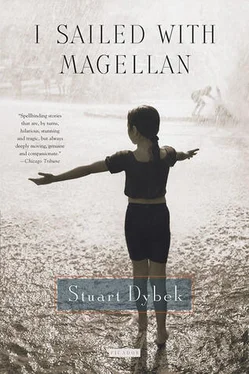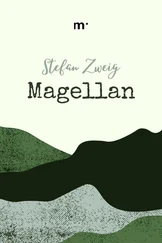I don’t know what became of Camille Estrada. After Christmas break that year in eighth grade, a rumor spread that beneath the blue cardigan buttoned to the top no matter what the weather, Camille was wearing falsies. Sister Lucy didn’t inquire about the matter directly. Instead, she asked Camille not to wear the sweater during class, it wasn’t part of the school uniform. Camille correctly observed that by eighth grade the uniform code wasn’t strictly enforced, and besides, she was cold. So Sister Lucy offered to move her to a desk beside the radiators. Camille thanked her politely and said that wouldn’t be necessary, in the future she would leave her sweater at home.
But the following day, Camille still wore the blue sweater. After morning prayer, Sister Lucy reminded Camille that she’d promised to leave her sweater at home and asked her to hang it in the wardrobe — immediately. Camille remained seated, composed, silent, defiant. Sister Lucy observed that such behavior was hardly what she expected from the class valedictorian. The class went quiet. There’d never been a hint of confrontation between Camille and any of the nuns before.
“I want you to remove your sweater now,” Sister said, taking a step down the aisle toward Camille.
Camille replied softly in Spanish.
“What did you just say?” Sister Lucy demanded. The previously inconceivable possibility that Camille might have just cursed her stopped her in her tracks.
I, too, wondered if Camille had cursed. But later, Angel told me what she’d said was a proverb he’d heard his abuela use: “ El hábito no hace al monje .” The habit doesn’t make the monk.
Camille didn’t repeat the words. Almost wearily, she began unbuttoning her sweater, but Sister Lucy stopped her.
“Camille, I want to speak with you in private. Please go to the principal’s office and wait there for me.”
This time, Camille complied immediately. As she rose and left class without another word, the half-unbuttoned sweater gave us a flash of a bosom worthy of Marilyn Monroe. It didn’t look natural on her, but I remember thinking, What if those aren’t falsies Camille was concealing?
“BB zizboombah!” Norky saluted, and Camille’s lips retracted in what may have passed for a smile.
Afterward, we learned that, instead of the principal’s office, Camille had gone to our small school library, where a senile nun named Sister Angelica presided over the books. Camille didn’t demand her old illustrated novels back. She checked them out on library cards and left, never to return. That was the last time I saw her, but hardly the last time I thought about her.
By junior year in high school, my earlier fascination with stories from Greek mythology evolved into an addiction to science fiction. I’d read on the bus to and from school, and sometimes late into the night, and each Saturday I’d stop for a new fix of sci-fi at the Gad’s Hill Library, which had also been my father’s neighborhood library. Sometimes, I’d imagine him going there when he was my age. He’d told me that as a kid he’d read every Hardy Boys mystery on the shelves but that, after reading a biography of Andrew Carnegie, he realized reading novels was impractical, a way for daydreamers to waste time. I decided to read every book in the science fiction section.
One sleeting, gray afternoon, sitting at a window table in Gad’s Hill, reading Ray Bradbury’s Illustrated Man , I came upon a story called “The Man,” about earth voyagers to a distant planet who just miss Christ’s appearance there. The captain vows to keep questing after the Man until he finds him. “I’ll go on to another world,” he says. “And another and another. I’ll miss him by half a day on the next planet, maybe, and a quarter of a day on the third planet, and two hours on the next, and an hour on the next, and a minute on the next. But after that, one day I’ll catch up with him!”
There were no hooved Centaurians, but the idea of following Christ from world to world was so reminiscent of Camille’s story that I couldn’t help wondering if she’d stolen it. Or if, by seventh grade, her imagination was already the equal of Bradbury’s. I recalled the afternoon when the two of us stood beating erasers, and Camille confided that she’d done penance for stories — stories that I’ll never know if she wrote or only imagined writing. She’d wanted me to tell her a secret from my dreams, a secret from dreams I hadn’t had as yet, and so I didn’t quite understand what she was after.
“It’s about feeling,” Camille had insisted.
I didn’t understand then that she was talking about risk.
There’s a recurrent dream that visits me less and less frequently. I first had it after my father took ill. In the dream, I’m pulling the red sled, but not loaded with a Christmas tree. What I’m hauling is an automobile battery, just as we actually did once in winter when my father’s Plymouth died at the factory lot. Rather than spend money to have a wrecker come out and jump it, he unbolted the Atlas battery and caught a ride home with a fellow employee. He left the battery at a gas station to be recharged, and after supper we walked to the gas station with the sled. The grease monkey — as my father called mechanics — said he couldn’t guarantee the battery would hold a charge, and in this subzero weather the safest thing was to buy a new one. My father didn’t even bother to ask what he soaked for it.
The old sled creaked when my father set the battery on it. He cautioned that we had to be very careful not to tip out the battery acid and told me to center the battery on the sled. I couldn’t even budge it.
“You practice lifting that, sonnyboy, and you’ll become Charles Atlas.” He laughed. “Nobody will kick sand in your face.” Then he repositioned it and we began the long trek back to the factory lot.
A curfew of cold had emptied the streets. It was probably approaching my bedtime — unusual for my father to have kept me out late, but that was how it happened, as if something important was going on. We crossed Rockwell, a border between blocks of apartment buildings and blocks of factories. Past Rockwell, the total absence of trees gave the industrial-strength streetlights a bluish glare that made the temperature seem to drop another few degrees. Even in summer the cracked, fissured sidewalks could be treacherous, as if a localized quake had occurred along these miles of truck docks, warehouses, and abandoned factories. Snow piled up unshoveled all winter. We took turns tugging the sled through the drifts and over mounds of dirty ice, one of us pulling, the other steadying the battery. I secretly wouldn’t have minded the sled tipping, as it repeatedly threatened to, because I wanted to see the reaction between battery acid and snow. Wind bored to marrow, and my feet in rubber galoshes and fingers in rabbit-furlined gloves went achingly numb. My face felt raw and chapped from the woolen scarf I’d raised like a mask, and I began worrying that the battery would be dead when we got to the car, that the engine wouldn’t turn over, and that we’d have to lug the battery all the way back to the gas station. I don’t remember a word of what we said as we walked, if we said anything at all, and yet there wasn’t a time when I felt closer to my father.
In the dream, I’m tugging the sled alone, and, without my father along, the effort seems increasingly senseless. Knee-deep in drifts, navigating mounded ice, I glance back to make sure the load hasn’t tipped, and in the squint of streetlights realize that it’s my father, blue with cold and reduced to an ancient child the compressed weight of a battery, which I’m pulling.
Who knows why certain humble objects — a bike, a sweater, a sled — are salvaged by memory or dream to become emblems of childhood? Childhood, an alternative universe expanding into forgetfulness, where memory rather than matter is the stuff of creation.
Читать дальше












